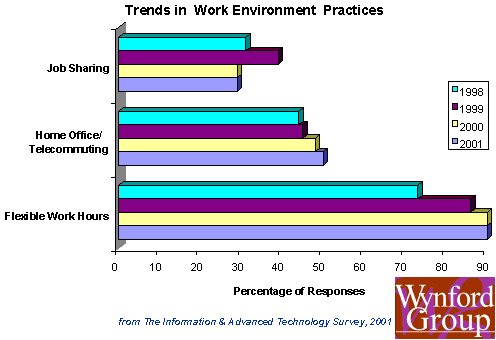|
|
||
|
|
||
|
ARTICLES |
|
|
|
||
|
Trends in
Alternative Work Arrangements |
||
|
|
||
|
As
in other areas of Human Resource Management, flexibility has increasingly
become an important factor in determining effective work arrangements that
suit the needs of specific employment sectors and serve as attraction and
retention strategies for employers. To accommodate employee needs, increasing numbers of
organizations have implemented the following alternative work arrangement
strategies:
The
following chart displays trends in these practices over the last 4 years
in Alberta:
Demographically driven changes are affecting workplaces, in particular, many Baby Boomers are approaching retirement age. Some of the unique expectations for retirement that will emerge include many Boomers remaining in the workforce during their retirement years, whether it be to start their own business, work full-time at a new job/career, or work part-time/flex-time hours for the sake of interest and enjoyment. Boomers will experience retirement dramatically different from a generation ago, as evidenced by fewer Boomers moving to new geographic locations, their tendency to have a lesser concern about making ends meet after retirement, and expectations of minimal disruption to their current lifestyle. Employee groups’ aged 45 and older account for close to 35% of the working population. Specifically, over the next decade a substantial number will be eligible for retirement leaving insufficient numbers of younger workers to fill these vacancies. To add to this problem, there are specific skills and knowledge held by some of these “senior employees” that are not easily or quickly replicated. For example, in the energy sector in Alberta, there has been an ongoing shortage of experienced Reservoir and Exploitation Engineers, which has been compounded by a reduction in emphasis on in-house training & development for these specific skills. In response to these conditions, there are several emerging strategies that are gaining prominence.
From
a workforce talent management perspective, the use of this strategy is
beneficial to both employers and employees for the following reasons:
This
strategy also has some implications for pensions and benefits, which
suggest that employers examine of the potential use of different pension
plan strategies to provide the most useful benefits to employees, yet
realize cost-effective results for employers.
This also supports the use of flexible total compensation
strategies. For example, a
Calgary-based energy producer is developing a Flexible Total Compensation
Plan which includes cafeteria choices for cash, benefits, retirement,
vacation etc. 2.
Mentoring In
the present knowledge economy, many industries are increasingly dependent
upon continuous learning and the development of specific skills and
competencies. Combined with
the projected skill shortages and demographic challenges, mentoring is
viewed as an effective method of key knowledge transfer. This can be accomplished by: Internal
Mentors/Coaches:
External Mentors/Coaches:
3. Flex Strategies The use of the “portable office” where laptop computers, PDA’s, email and other business tools can be plugged in at home, client site or the cottage as easily as the office has increased the flexibility of employees to work in many different environments without losing significant productivity. Office Hotels: An increasing number of professional services firms have offices that employees can book for the time they need when they are in a particular location. IBM is a good example of the use of this strategy. As employees work more independently to produce results, the use of flexible hours has become more common, which allows employees to plan their own work time and work balance. For example, Westjet has recently implemented flextime for some groups of employees, which identifies a specific number of hours of work per week, with the employee determining the scheduling of these hours, with the intention of providing greater work/life balance. In
conclusion there is increasing pressure on employers to develop and use
alternative work strategies that fit their particular business and
employee needs, as well as making the most effective use of their Human
Capital. A key component of
success appears to be providing the greatest amount of work flexibility
that their organizations can tolerate. |
||
|
|
||
|
For more information THE WYNFORD GROUP |
||
|
|
||
| Vancouver - Edmonton - Calgary - Winnipeg - Toronto - Montreal - Los Gatos | ||
|
|
||


